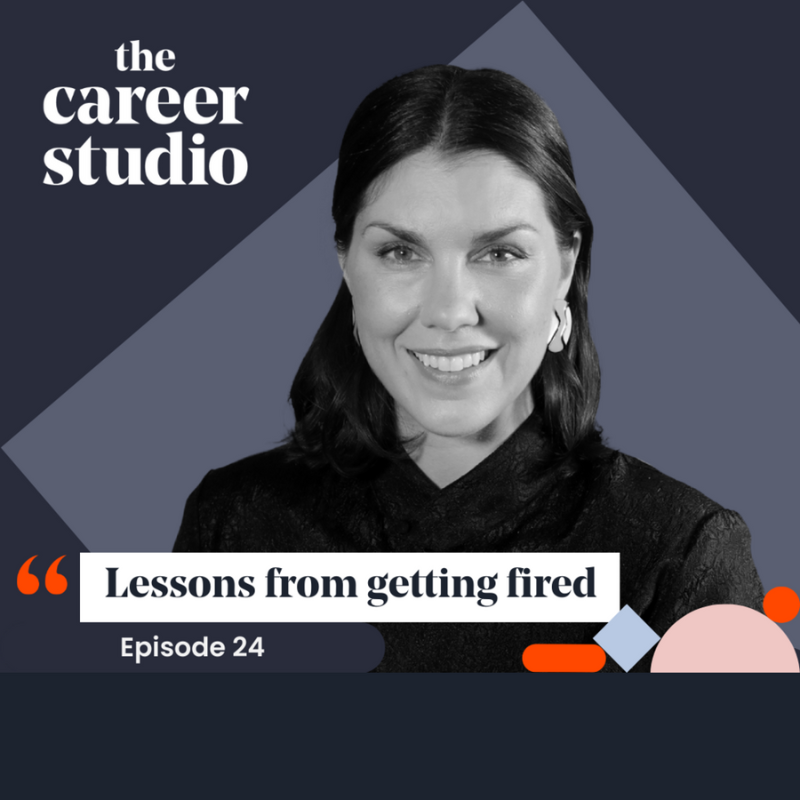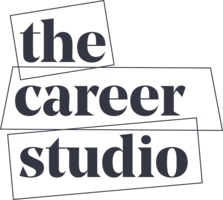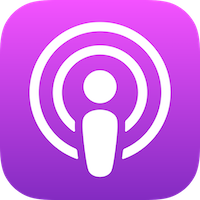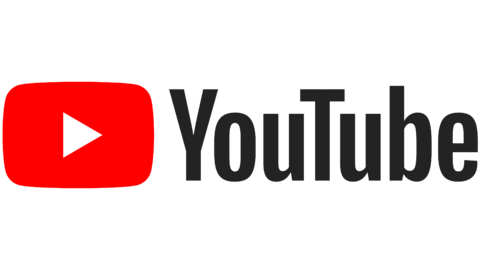Lessons from getting fired

I consider getting fired one of the best things that’s ever happened to me. And even though it’s certainly inconvenient and uncomfortable, I consider it a blessing in disguise for most people. In this episode I share my own story of getting fired plus those of people I know and have worked with to help you see why in most cases, it’s an opportunity to re-design your career in a way that better suits who you are and what matters to you. The people and environments that aren’t right for you will reject you in some way, getting fired is an example of that.
In this episode I discuss:
- The beliefs that got me into a role that wasn’t right
- What I had to come to terms with when I actually got fired
- The relationship between alignment and getting fired
- Examples from clients and friends who’ve also been fired
- The narratives to focus on instead to create more acceptance and confidence from getting fired
Are you ready to create an energizing career you love?
You can create a career that is simply an extension of who you are and how you want to live your life. If this sounds like what you’re after then schedule a consultation. We'll get to the bottom of what's going on for you. And exactly where you need to focus to bring your career and life into alignment. It's free!
For more from The Career Studio
Transcript
Welcome to the career studio podcast, where we boil down the noise and focus on the core concepts, essential for building an energizing career you love. One that is simply an extension of who you are and how you wanna live your life. Anyone can do it. It's just a matter of knowing what to focus on.
Hi guys.
I got fired once. And like most people, I felt embarrassed and ashamed. I think culturally we tend to associate getting fired with the idea of failure, and we associate failure with the feeling of shame, right? Which then results in low self-esteem. And when we have low self-esteem, this impacts what's possible in our career and in our life.
But this was, I don't know, five or six years ago, and today I call getting fired one of the best things that's happened to me and generally I consider getting fired while certainly inconvenient and uncomfortable, ultimately, a blessing in disguise for most people. And if we can learn to see it through this lens, we free ourselves of the embarrassment and shame and the ensuing lower self-esteem that impacts our life.
So I wanna tell the story, my own story of how I got fired and the lessons I learned and, and weave in a few other stories from friends and clients to help you see getting fired in the same way. Whether you have been fired or you haven't been fired yet, hopefully this podcast supports you. I honestly believe everyone should get fired at least once in their life. To learn and to go through what I'm about to talk about.
Okay. So as regular listeners to my content in this podcast, know that after my M B A, I found my way into tech, which seemed like the right next step and because I thought it would look good on my resume, and I thought that's what successful people did is work in tech.
I quite quickly realized that I don't really care about tech and I didn't really enjoy it. But regardless, I stayed in the space to kinda try and prove to myself that I could do it, maybe prove to other people that I could do it, and I ultimately found myself as the first non-engineering hire at a seed stage hardware startup.
We were developing a new kind of planter box that connected to an app on your phone and could grow anything. Anyways, it was a terrible fit in every way imaginable. I, I think I had thought I would get more support and budget than I got, which was a mistake on my part in terms of doing due diligence ahead of accepting the role.
And then ultimately I just didn't think and act in the way they wanted or needed. Right? They wanted someone who was scrappy and could do every part of the marketing toolkit themselves, so web build and analytics and PR and social ad creation and monitoring and partnerships, and email marketing and VC pitching and all of that.
And I certainly did my best, but it was my first time doing a lot of that stuff. Some people love that they really thrive in that kind of environment, but for me, not so much. I really found it completely overwhelming, really hard. I didn't really like figuring all that stuff out. I didn't like being the only person doing all those things, you know?
And I also felt like I was being asked to do a lot of stuff that I wasn't able to deliver on. I cried frequently and the CEO was constantly reprimanding me for not doing stuff the way that he wanted. He, uh, was Israeli and Israelis tend to not mince their words. So that was a kind of a culture thing.
And, you know, not only was it not a good fit, You know, it wasn't what I wanted it. I wasn't who they needed, but I felt like I was working in a place where it wasn't okay to say, I don't know, I made a mistake, or I need help. So I was constantly stressed, constantly anxious, and on edge, not performing. It was for sure the worst six months of my life, and yeah, exactly that.
It was six months, because after that he asked me to leave. And I was mortified. I was super embarrassed. I didn't tell my family, I didn't tell my friends, you know, I felt ashamed, like I wasn't good enough. I couldn't hack it in tech, you know, that I wasn't cut out for startups, which must mean that I wasn't smart because everyone was working in high-growth tech startups, and that's what smart and successful people did, right?
And so when I had that narrative that made me hide. Right. I had to lie about why I wasn't working there anymore. Kind of kind of tell a half truth, which obviously disconnected me from other people because I wasn't connected to myself and I wasn't telling what actually happened, and it made me feel ashamed.
And so as I'm looking for new jobs, I'm not presenting myself in a confident way. I remember after leaving that job, I was looking at maybe going back into advertising or doing something slightly different in strategy, and I went through a couple interviews and I just, I had feedback from a recruiter saying that I sold myself short in an interview that didn't come across confident, and it's because I was ashamed and embarrassed about what had happened.
But in reality, getting fired was really the wake up call I needed because I was really forced to be honest with myself about what I really wanted to do professionally, what I wanted to think about the types of people I wanted to work with, what was important to me about the culture and the support and the structure of the business I was in.
I'd been in this whole narrative. I need to be good at tech. I need to like thrive in the tech industry for whatever reason. But I had to come to terms with like, I don't like tech. I don't really like working on hardware projects or working with engineers. And actually what I really like is personal development.
What I really love is coaching, you know, by that time I had started coaching on the side. And I had to come to terms with like a role like growth marketing, where that was like very analytical and required a lot of setup, wasn't really the best fit for my strengths and interests. I didn't get to develop people.
There wasn't a lot of relationship building. Ultimately, a role like that wasn't gonna be the career path where I thrived and created great impact. You know, if I wanted to create impact, I was gonna have to go somewhere else. Owning that narrative, coming to terms with actually who I was and what mattered to me, that allowed me to hop at a role that was going at a training and coaching company that a friend of mine worked at.
And you know, the role paid significantly less than I was getting paid in tech. But I could see it would set me on a path that was a better fit for my strengths and interests. And actually, funnily enough, it was still a marketing role and I was still kind of setting up a marketing department from nothing, but it worked a lot better for me because I had two supportive bosses. I had budget and I was more interested in the topic that I was working on.
And then I knew that role was never a marketing role, was never gonna be the long-term solution for me. But I was in training and coaching, and so I knew that this was a much better space for me to thrive. Two years ago or two years prior to that, I never would've taken that role because that wouldn't have seemed like a sexy enough job. I would've still been in this allure of like, I have to prove myself in tech. I have to be this version of what I think success looks like.
Right, and, and getting fired allowed me to say, I have to define what success means for me, not how I think success is defined by other people, so, Right. So ultimately taking that job at the training and coaching company put me on a trajectory that's allowed me to build the business that I run now, which feels so rewarding and like a really great fit for the person that I am.
You know, the work that I do comes naturally to me. I enjoy the process of addressing the challenges that I face and learning and getting better at my craft. I'm genuinely interested in the topics I have to think about, and I read books that are relevant to my work all the time in my personal life, and I almost never feel any sort of stress and certainly not the panicky kind of stress that I used to feel in tech and even in advertising.
The reason I'm here now, feeling so aligned and energized in what I do professionally is because I got fired. Because really the people and the environments that aren't right for you will reject you in some way. You know, I wasn't able to contribute my superpowers of connecting with people and understanding people and seeing people clearly and helping them see themselves and connect with themselves as these are my, some of my superpowers.
I wasn't able to use that inner role that was just growth marketing in tech. I didn't get to use any of the parts of me that make me shine. It's not that I wasn't good enough, it's just that I was in the wrong space. And this is the problem. When you're an ambitious overachiever, you're used to just achieving in every environment in school.
It's just like, okay, well what's the coursework? Now I'm gonna learn it, even if it's not that interesting, I know how to learn it, and then I'm gonna perform on this test. Okay. So you get used to just performing and achieving, even if you don't really like what's in front of you. But this doesn't work long term in the professional setting, right?
You burn out and really the reality is you can't excel at everything. Right, because if you're just trying to hustle and be good at something that you aren't interested in, you're never gonna perform as well as the people who genuinely like the subject and are well suited to the role. Right? So it's a, it's a recipe for burnout, and you'll just never be as good as the people who are well suited.
So it's like you're just wasting your time trying to achieve in an environment that isn't a good fit.
So look, yeah, I get it right? Getting fired. It stings emotionally because probably you thought that space was gonna be the one and, and now it isn't. And you kind of have to come to terms with that mentally. And if you don't have a severance package, or, you know, it can hurt financially if you're not set up for that.
But at the end of the day, it is a wake up call to look at why it didn't work. Likely there is something about the role or the company or the culture that just wasn't a good fit for you. It's really an opportunity to learn more about yourself so that you can course correct and find different opportunities that are better fit for you, that are more in alignment.
And so I'll give you a few examples of other people getting fired and kind of how I think it helped them. A friend of mine got fired from a company because she gave her team a day off, a vacation. They just like worked on a big project and she wanted to give everyone a break after delivering this big project, and the leaders of the organization didn't like that she did that and they fired her.
And she realized that the values of the leaders and the lack of autonomy she had around deciding when to give her team a day off that didn't match up with her own priorities, right? And in her next role, she really looked for a role where she had autonomy and she had a good culture fit with the leaders of the business.
I had a client who got fired completely out of the blue, right? For unspecified reasons. And he had kind of always suspected it was because someone on the leadership team didn't like him. And when he and I really got into talking about what happened, what I learned was that. Him and this person on the leadership team had very different opinions of how to approach negotiation and collaboration.
Right. And the person on the leadership team was very combative. He always would, yeah, be combative, be argumentative, say no, kind of be firm. He had a very kind of aggressive approach to negotiating a collaboration. And my client, Is a lot more collaborative, right? A lot more solutions oriented. You know, it's something that he really values about himself.
He's just a much different energy and not an aggressive energy. He's very much a people person and really values different people coming together and working well together. And in fact, what we pulled out of our coaching conversations is that leader had derided him on multiple occasions for his approach.
Two negotiations. Right? And so what we were able to realize from diving into actually what happened is like, well, this was a culture mishmash, right? It's not about something my client has done inappropriately or wrong. It's just that he was not a good fit for the values of that team. And did he actually wanna work with someone who had such an opposite view of how to negotiate and collaborate. And he concluded no. Right? Instead of having this narrative of like, I should have said something differently, I did something wrong, and being in this shame spiral, really owning that wasn't the right place for me. I wanna be in a place that respects the way I work and shares my values.
I had another client who earlier in his career, he joined a company in a communications role that required him to do PR in addition to some of the social work that he had been doing, and he had most of his experience in, and he didn't like the PR work. He found it super draining. You know, and after a few months they fired him and he realized from that, gosh, I don't wanna touch anything to do with PR.
Right. I'm not gonna look at those kinds of roles. That's not for me. And so he really owned that narrative of Yeah, I tried that and I realized I don't like PR. It's not like because I didn't like PR, I'm somehow broken. Right. That I need to, I need to be good at that. No, own that. You don't wanna do that. And that's what he did.
So those are just a couple examples. You know, it's just these situations, people found themselves in environments that didn't fit with the person that they are. It's the same as being in a relationship. Go listen to my episode on how careers are like romantic relationships, right?
Not everyone is gonna be a good fit for you. It's not because you're not worthy and not lovable, it's just because you're not a culture fit. And getting fired is the same. When we make getting fired mean that we suck or we aren't good enough, or we should be ashamed, then we reduce our self-confidence, right?
And when we reduce our self-confidence, it's harder for us to find our next thing because we're in this head space of I'm not good enough. And that's not a head space that's gonna allow you to go for big dreams and ambitions. It's hard to find what you are great at and how you do add value if you are like, I suck.
Because each of us has a unique way that we add value to the world. Knowing what yours is, is the secret to unlocking fulfillment and alignment. And frankly, if you've gotten fired, you're just gonna be one step closer to figuring out your gifts, your superpowers, and your priorities. So make getting fired a lesson in what you don't want.
Use it to empower you to take your next step with more clarity and conviction. We have to rub up against what doesn't work in life in order to figure out what does. Have a great week.
Hey, if you're ready to create an energizing career you love, one that is simply an extension of who you are and how you want to live your life. Then I wanna invite you to schedule a consultation. We'll get to the bottom of what's going on for you. And exactly where you need to focus to bring your career and life into alignment. It's free. Just head on over to thecareer.studio/schedule to find a time that works for you, or if you're enjoying and getting value from these episodes, I'd love you to leave a short review on whatever podcast app you use.
This helps other people like you find and get value from the podcast too.



